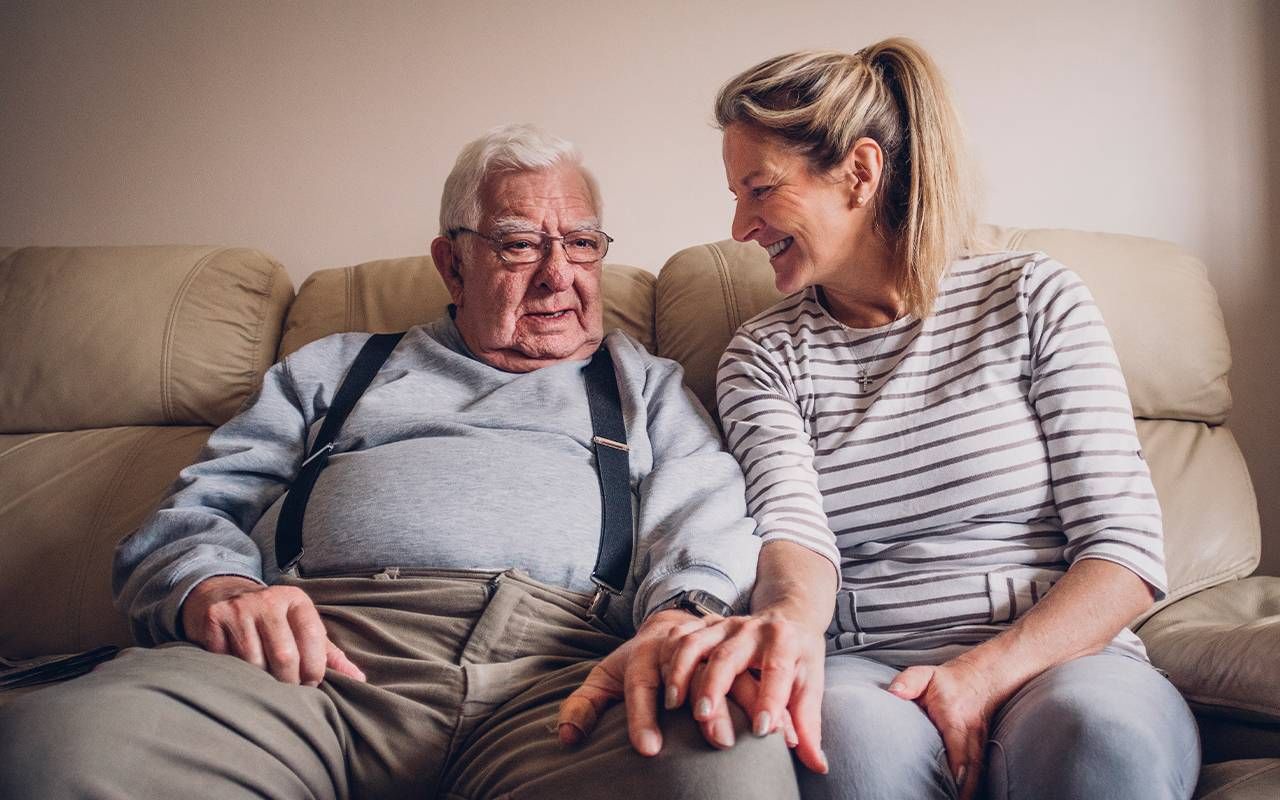What to Expect When You’re Expecting an Older Parent to Move In
To start, you will probably be unprepared, no matter how much time you have to get everything in order
When my brother suggested that my father move in with him last year, it seemed like a no-brainer.

Dad was almost 91 then, and couldn't really live alone any more. My husband and I (and our grouchy teenage son) lived near Dad, but we were feeling the strain of grocery runs and doctor appointments — and worrying about our son's iffy high school grades.
If Dad moved in with my brother and sister-in-law, he'd have support and care; we'd be able to focus on getting our son from high school to college; and my brother would get a little extra income. A win-win-win!
So why didn't things go as planned?
Hello, Blind Spots
Turns out that despite our best intentions (and you know what they say about good intentions), we were woefully unprepared — like many other well-meaning, middle-aged "kids" who take in a parent.
"Typically there's no planning when an elderly parent moves in," says Jennifer FitzPatrick, MSW, author of "Cruising Through Caregiving: Reducing the Stress of Caring for Your Loved One."
"Despite our best intentions (and you know what they say about good intentions), we were woefully unprepared — like many other well-meaning, middle-aged 'kids' who take in a senior parent."
That surprised me. If you're in the middle of a health or financial crisis, as many families are when they take in an older parent, of course there's no time to stop and think. But we had a few months to lay the groundwork for this transition — the timing, the cost, the logistics.
While those practical issues are important, many families experience a kind of caregiver shock because they underestimate the impact of the move on their personal time and space, their relationship with the parent/grandparent, and even the emotional dynamics within the immediate family itself. "A lot of people worry about the big things," FitzPatrick says. "Like, what if Mom falls in the middle of the night? But it's really the little things that build up."
Given that multigenerational households in the U.S. are increasing, you'd think our collective ability to foresee some of these problems would also be expanding. But although over 50% of those living with adult relatives other than a partner or spouse say it's convenient / rewarding all or most of the time, 23% say it's stressful all or most of the time, and 40% say it is stressful some of the time, according to a 2021 survey by the Pew Research Center.
Surprise #1: Meet Your New Roomie
Why, exactly, is it so hard to adjust to the realities of shared living quarters with your aging mom or dad? Because . . . after decades of not living with your parent(s), FitzPatrick says, suddenly you're roommates, with all the intimacies and frustrations that come with that arrangement. Like: Where do you put the used pull-up diapers? Is there a senior Diaper Genie? Should you just use a regular Diaper Genie?
Sorry to get right to the nitty-gritty, but these are the things that come up.
So, while rearranging the furniture and getting your parent to their physical therapy appointments is essential, also brace yourself for a string of minor irritations in the day-to-day that can really fry your nerves.
Surprise #2: Past Is Still Present
Making the roommate vibe worse is that your new roomie is actually your parent, and you're not starting with a clean slate; you're carrying some baggage. Whatever your traditional patterns are with your mom or dad, they don't go away just because now they're depending on you. As FitzPatrick put it: "The dynamics are so wonky."
"Once your elderly loved one roommate moves in, everything gets magnified."
Wonky is as good a word as any to describe how convoluted it feels like to deal with an aging parent who no longer calls the shots — yet they may think they do, or they may try to, or you may let them — or you may find yourself in a constant state of irritation and guilt because — wtf!
You know?
So while it's tough to anticipate what the likely tension points might be, it's not impossible. You just have to be honest with yourself — because once your elderly loved one roommate moves in, everything gets magnified. Being aware that these complicated feelings are naturally going to arise, in one way or another, can help you to spot them and — maybe — find more rational (or compassionate) ways to ease the situation.
Getting therapy is also a thought.
Surprise #3: Mind the (Expectation) Gap
When a senior parent moves in, one of the things you do to age-proof the house is to remove tripping hazards: slidey throw rugs, say, or your kid's skateboard that lives in the foyer.
In the same way, you have to find a way to identify and articulate hazardous intra-family expectations so they don't knock you sideways.
One of the biggest expectation gaps in families, FitzPatrick says, is around downtime. I thought she was going to flag money as a hotbed of miscommunication and crossed expectations. Because it is. But downtime can be even worse in a family caregiving situation because expectations can get muddled on so many levels.
Case in point: After my dad moved in, my brother and I were on a casual caregiving rotation. Dad lived with him, but would stay with us for occasional weekends. It was only by accident that I discovered our informal "system" wasn't working, because my dad happened to mention that he rarely saw my sister-in-law. Um, what?! That was a red flag. What on earth was going on?
"It was only by accident that I discovered our informal 'system' wasn't working."
After talking to my brother and sister-in-law I learned that my Dad expected they'd keep him company at night, and my brother felt obligated to do so. As a result, their normal social life (and couple life) suffered from the strain, and my sister-in-law kept to herself more and more, for her own sanity. Which I totally understood. My father has a way of looking both abandoned and accusatory when you leave him alone.
My brother and I decided to try a new rotation system that would give them more predictable time off — and my family more regular time "on" with Dad here at our place. And while the new routine is better for sure, it underscored the need to keep this particular channel of communication unclogged. As we all know, caregiver burnout is very real — with potentially dire consequences for the caregivers as well as those they care for.
10,000 Other Thoughts on This Topic
Now I can admit something I didn't want to say earlier, although it's probably obvious by now. We plunged into this massive life transition — one that directly altered the lives and sleep cycles of four middle-aged adults, one senior, and one teen, never mind collateral damage in other parts of the family — without doing any research. I mean, we didn't even google.
We just trusted our very smart brains and big hearts to know what to do, instead of consulting reliable sources: for example, the zillions of people who have already gone down this route and have tales to tell. My advice: Don't do that.
There are many, many informative, practical articles on what to expect when your aging parent moves in. Here are a few other things I wish we had known.
- Whatever age or stage your parent is in, remember that you're not in an upswing here; you're signing on for an inevitable decline. So give some careful thought about how to pace yourself and your family — and start making Plan B.
- Get other people's opinions, FitzPatrick advises. You may think you've thought of everything, but other people will help you troubleshoot in ways you'll be grateful for.
- Set up services in advance if you can. Once Dad was all moved in, it was surprisingly tough to get him registered with programs and services (such as the local senior center and the YMCA). I think it's because we, as caregivers and co-caregivers, are tired, and even a few extra forms to fill out can take months.
- Last: Talk as kindly and as frequently and as openly as you can about money — if you can manage all those adverbs. Money shouldn't come first, but it shouldn't come last either. And as painful and awkward as it can be, opening up about who's paying for what (or not) does in fact get easier with time. I swear.
One last thought from Jennifer FitzPatrick, which I found helpful: Don't feel bad or guilty or anything if you have to course-correct. After 18 months of our Dadventure, it has come time to find more permanent, long-term care for our father. We knew this time would come, and yet it feels strange — and sad. This time we'll google ahead, to see what this next transition will hold.


